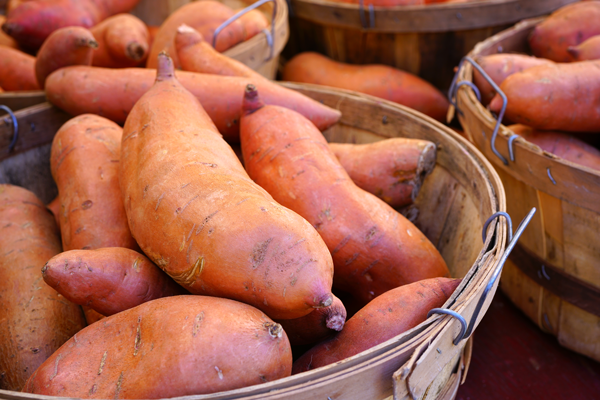BENSON, NC - On the heels of Thanksgiving, the unofficial sweetpotato eating holiday, The North Carolina Sweetpotato Commission (NCSC) is reporting a smaller annual yield despite a slight increase in acreage after a challenging growing and harvest season. Estimates are that yields may be down 20-30 percent across the industry.

Michelle Grainger, Executive Director of the North Carolina Sweetpotato Commission remarked, “2023 and 2024 have proven to be challenging years for agriculture in North Carolina that have forced sweetpotato growers to make hard decisions to stabilize our industry. It isn’t any one factor causing these changes, or even market demand, as much a change in global markets and unpredictable weather events.” Grainger continued, “but like every farmer, optimism remains, and our industry is making forward-looking investments in consumer research and retail programing to drive sales.”
Despite the reduction, North Carolina remains the largest producer of sweetpotatoes in the nation, producing over 60 percent of the total sweetpotatoes grown in the U.S., a press release shared. The state has held that leadership position since 1971. That leadership continues today thanks to an industry focused on sustainability in production across the supply chain to meet changing industry demands.

Changes in sweetpotato production are not uncommon. Over the last 10+ years, there has been volume movement up and down because of weather conditions, global markets, the pandemic and its lingering impacts on the foodservice industry, as well as the continued reality of rising input costs and labor challenges.
The NCSC recently completed a nine-month sales development program that culminated in the successful conclusion of three retail pilot programs that tested a variety of marketing strategies to promote sweetpotatoes outside of traditional seasonal holiday windows. The programs included digital promotions, nutrition programming, produce manager education and in-store POS that resulted in double digit sales movement for the participating retailers. The NCSC and industry members were elated with the outcome proving the potential to unlock new sales year-round.

“While our supply may be reduced, our promotional efforts will not slow down. We are proud of the high quality sweetpotatoes we produce and stand behind the quality of our products and production practices that have made us the industry leader,” Rob Hill, President of the NCSC Board of Directors and Co-Owner of Tull Hill Farms said. “I believe these investments in retail programs and forward-looking marketing are proof that the NCSC and NC sweetpotato growers stand ready to build a more sustainable industry and support continued education and consumption efforts that will help us develop better relationships and continued transparency in our supply chain so everyone can win.”
Regardless of acreage changes, plans continue to educate consumers on the value of sweetpotatoes as a nutritionally dense superfood with excellent shelf life and culinary versatility through our Any Reason, Any Season marketing campaigns.

The NC sweetpotato industry recognizes that it is inevitable that volume will be impacted with the current yield decreases and buyers should work with their grower-shippers on a regular basis to evaluate seasonal changes and volume against demand. Buyers should also work with the NCSC to establish promotional programs that support strong sales and pricing programs that drive consumer value and retail margin.
Keep reading ANUK for more news on the sweetpotato sector!


